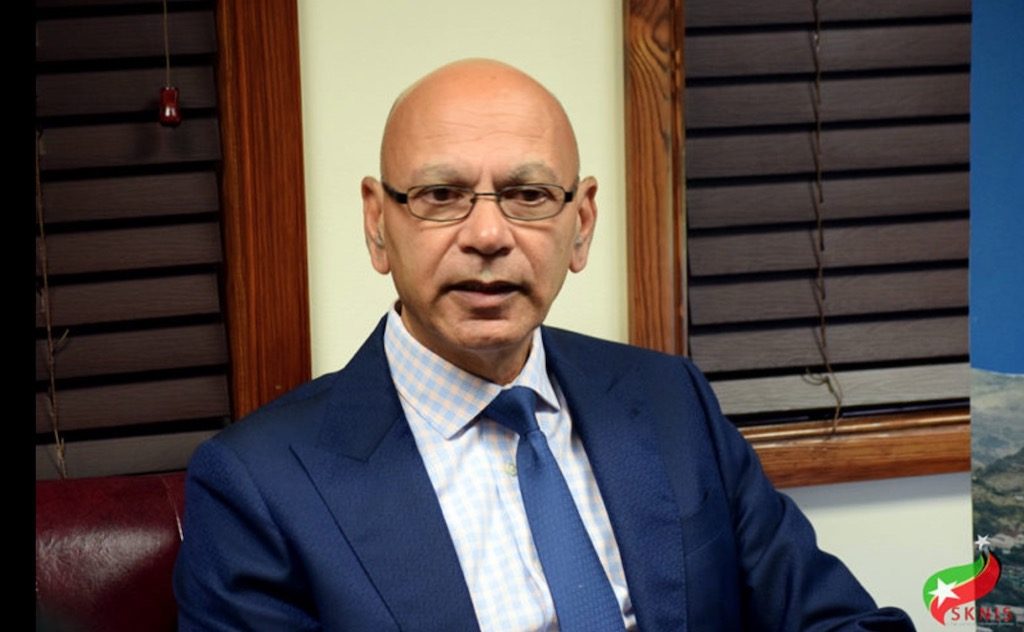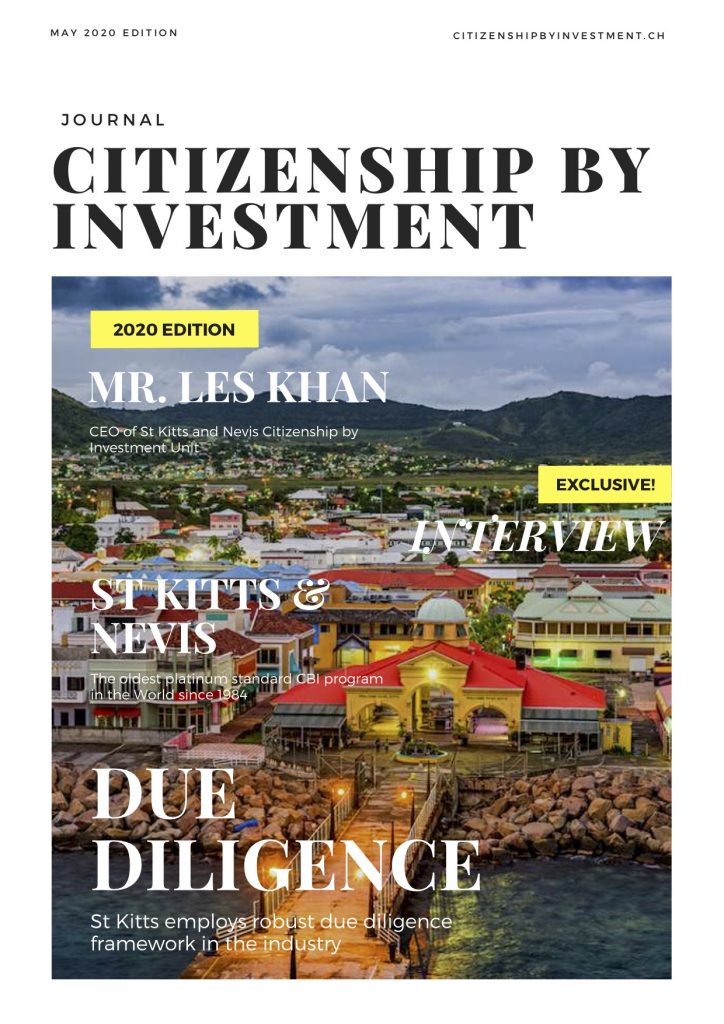CIP Journal reached out to CEO of SKN Citizenship Unit for an interview. Please read below our exclusive interview with Mr. Les Khan, Head of St Kitts and Nevis Citizenship by Investment Unit (CIU).
Mr Khan explains the importance of CBI contributing to St Kitts economy and the screening process involved with vetting clients.

Summary
- St Kitts and Nevis has a robust internation due diligence system in place, to protect our citizens and our country’s integrity.
- CBI is vital for the prosperity of SKN and has made a significant contribution to the local economy, with St. Kitts and Nevis achieving the fourth highest GDP per capita in the Caribbean according to IMF.
- SKN is looking forward in working with our regional and international counterparts to cement the future success of the CBI industry
- Any applicants who would present security or reputational concerns to the CBI programme and to the nation of SKN, are turned away. Applicants from Afghanistan, Cuba, Iran and North Korea are not permitted to apply to our CBI programme.
- Bitcoin and cryptocurrencies will not be accepted for the citizenship program
- No rules will be relaxed despite the Covid-19 pandemic
INTERVIEW QUESTIONS
1. How has the CBI programme changed SKN in the past 35 years?
Since its inception in 1984, the St. Kitts and Nevis CBI programme has helped progress the development of the small island state away from its historic sugar farming industry and onto a more sustainable footing, by helping to grow a thriving tourism industry and allowing the country to invest in its national infrastructure. The programme has enabled St. Kitts and Nevis to become one of the fastest growing economies in the Caribbean.
The programme has made a significant contribution to the local economy, with St. Kitts and Nevis achieving the fourth highest GDP per capita in the Caribbean (source: International Monetary Fund). According to the United Nations Commission for Latin America and the Caribbean, St. Kitts and Nevis had the strongest projected growth rate in the Eastern Caribbean of 3.5% before the COVID-19 pandemic.
The Sustainable Growth Fund (SGF), an investment route available for CBI applicants, has channeled direct investment into the Government of St. Kitts and Nevis. This targets resources into priority areas such as education, health, climate change resilience, infrastructure, and tourism.
The CBI programme is therefore integral to the country sustaining its development, and its success must be upheld to secure St. Kitts and Nevis’ prosperity.
2. What was the performance of the CBI programme for 2019?
The CBI programme continued to build on its success in 2019. On the hospitality front, the programme continued to attract some of the world’s most prestigious hospitality brands to our islands. Last year for example, Hilton Hotels opened its new KOI Resort Saint Kitts, Curio Collection by Hilton. The 102-room resort marks the hotel group’s debut in St. Kitts and Nevis, and is also KOI Hospitality’s first entry into the hotel space.
Funds collected through the CBI programme also contributed to a number of projects boosting the country’s economy. For example, CBI funds were used towards the construction of the new cruise pier at Port Zante, located on St. Kitts. The USD $48-million port expansion project was financed through local sources, with USD $5-million coming from the Citizenship by Investment programme.
Having welcomed 1 million cruise passengers before the end of the cruise season last year, a milestone accomplished for two consecutive years, St. Kitts and Nevis now holds the marquee status of larger cruise destinations in the region.
With the opening of the port’s second pier, Port Zante can now simultaneously host up to three of the world’s largest cruise ships, enabling us to welcome an increasing number of visitors, benefiting both local people and investors.
And the platinum standard of St. Kitts and Nevis’ CBI programme continued to be recognised internationally, with our passport ranking top of all Caribbean countries with citizenship-by-investment programmes once more, in Henley & Partners’ 2020 Q2 Passport Index.
3. Do you have any statistics for the programme?
St. Kitts and Nevis is the legacy CBI programme, being the oldest and most recognised in the world. As a result, the country continues to attract applications from across the globe and is determined to be the leader in terms of volume and processing. It is known for its efficiency and innovative approach to citizenship.
But most importantly, as the platinum standard for economic citizenship, SKN’s CBI programme also prides itself on high safety and security standards. Its ranking in the CBI Index published by Professional Wealth Management – from the Financial Times group – validates the CBI programme’s robust and unwavering due diligence process. In line with this, any applicants which would present security or reputational concerns to the CBI programme and to the nation of SKN, are turned away.
4. How many economic citizens are currently living in diaspora?
We are true believers in mobility on an international scale. We work to grant our citizens access to global business and leisure opportunities, as well as the ability to discover new cultural and travel experiences. The application criteria for SKN’s CBI programme, which includes no residency requirements, means that we have economic citizens dotted across the globe and making the most of the aforementioned opportunities.
The SKN CBI programme provides citizens with visa free access to over 156 countries including EU Member States, and the international connectivity of SKN enables our economic citizens to travel with ease.
“We are true believers in mobility on an international scale.” – Les Khan
5. Please explain the screening and due diligence processes for applicants?
As the world’s oldest CBI programme, SKN is committed to upholding its platinum standard of economic citizenship. For us, this means abiding by international laws and having a robust due diligence system in place, to protect our citizens and our country’s integrity. I was appointed as the head of SKN’s CIU in 2016 and since then, the SKN CBI programme has reviewed its application process and implemented a strict due diligence system in full compliance with national legislation and international standards.
This consists of a four-stage screening process and stringent checks made against sanctions, terrorist-financing activity, anti-money laundering and criminal databases. Clients are required to provide evidence of proof and source of funds, as well as a clean police report.
In order to verify applicants’ financial integrity, the CBI programme uses an independent third-party due diligence provider. Our commitment to stamping out illicit activity is demonstrated by the fact that SKN is party to the OECD Common Reporting Standards, which ensures that relevant information is shared as required with various financial institutions around the world.
Furthermore, we will be introducing biometric checks for all applicants, and are continuing to work with regional and global partners to check applicants against international law enforcement databases.
6. Which country nationals cannot apply for SKN’s CBI programme?
Nationals from countries on US and/or European sanction lists are excluded from applying to SKN’s CBI programme. Therefore, applicants from Afghanistan, Cuba, Iran and North Korea are not permitted to apply to our CBI programme.
In addition, it is worth noting that a person who has been denied a visa to a country with which St. Kitts and Nevis has visa-free travel and who has not subsequently obtained a visa to the country that issued the denial shall not be eligible to apply for citizenship in St. Kitts and Nevis through the CBI programme.
7. How has the CBI contributed to the real estate market in SKN?
We are proud to say that the CBI programme continues to create opportunities for investors and the local community, and this is especially applicable when considering SKN’s real estate market. Thanks to the CBI programme, we have seen a boom in the country’s construction industry, which accounted for over 18% of SKN’s GDP between 2015 and 2018.
The investments made in the country’s real estate sector have in turn benefited the local communities greatly. A boost in tourism and therefore resort construction has not only sped up job creation, but has necessitated additional upgrades in parallel, such as the rehabilitation of the island-wide main road through a USD $71-million investment.
In 2020 alone, two new hotels will open in SKN, all being approved real estate developments recognised by the CBI. St. Kitts and Nevis is also recognised as the only country in the OECS with 5 branded hotels. They are: the Marriott Hotel and Residences, the Park Hyatt, Koi, Ramada Hotel and Resorts, and the Four Seasons. TLOFT’s Pirates Bay by the Wyndham Hotels and Resorts can also be added to the list.
8. What problems has the CIU faced due to Coronavirus (Covid-19)?
St. Kitts and Nevis is the smallest country in the Western Hemisphere, with a population of just 56,000 people, yet the speed and decisiveness of our response have been anything but diminutive. In fact, early implementation of the government’s “Life First” strategy – restricting lucrative cruise ship visits and stringent checks of commercial airline passengers, leading in some cases to quarantine or entry refusal, at a time when many countries were doing relatively little – led to St. Kitts and Nevis being the last country in the Americas to confirm its first coronavirus case.
When its first two cases of the virus were confirmed, Prime Minister Timothy Harris immediately placed the country into a State of Emergency with lockdowns and curfews, coupled with an extensive USD $44.4-million package of worker support and economic stimulus measures – the largest package in the Eastern Caribbean. We are proud of the measures introduced by our government, and are confident that they will help support our local communities and investors through this unprecedented period.
We remain as committed as ever to delivering value and opportunities through the CBI programme, and aim to maintain its contribution to our country, which is more important than ever in these times. St. Kitts and Nevis was the first country to announce it would accept the submission of certain documents uploaded electronically. Notices were sent to agents and service providers assuring them that files would continue to be processed, giving them assurance that despite the lockdown measures the CIU was operating as normal.
9. Is the Government considering any changes to the programme due to the Covid-19 pandemic in 2020? Are you considering relaxing the rules, any price cuts?
Independently of the COVID-19 pandemic, it has always been our priority to deliver the best client-centric service for applicants and their families, even during times of change. We continue to work tirelessly to make our process evermore efficient and convenient.
On 26 March, we announced the implementation of a new process for the submission of applications to the programme. Effective immediately since then, the CIU is accepting the submission of certain documents uploaded electronically to our online system, the Citizenship Application Management System (CAMS).
Despite the challenging circumstances we find ourselves in, rules will not be relaxed. We pride ourselves on our platinum standard of economic citizenship and stringent due diligence process, and the current climate will not affect this in any way.
10. As SKN recently legalised Bitcoin/cryptocurrencies, is Government considering accepting virtual currencies in the future, to avoid de-risking issues with banks?
As the first CBI programme to make use of a digital portal to process applications, implementing the Citizenship Application Management System in 2015, St. Kitts and Nevis has always embraced digitalisation. The country has the highest level of internet penetration among the population in the Eastern Caribbean, making it a highly interconnected country. We are also very proud to have been ranked second in Information and Communications Technology (ICT) development in the Caribbean by the International Communications Union – an agency of the United Nations. Even if we are an island, we have shown to embrace the digital economy and look towards international competitivity.
SKN legalising cryptocurrencies is another example of our progressive approach to incorporating digital into our economy and way of life. We recently passed the Virtual Asset Bill 2020, a bill that legalises digital currency assets like bitcoin cash and aims to provide the regulation of cryptocurrencies for SKN’s businesses and residents.
But cryptocurrencies are not accepted as part of the investment required for the application to SKN’s CBI programme.
St. Kitts and Nevis will continue to work with the Eastern Caribbean Central Bank to further expand the use of cryptocurrencies, but through a structured and regulated environment.
11. How many applications have you received for real estate investment?
Our real estate investment option has continued to see sustained growth over the past years. We are glad to see that applicants continue to recognise the competitive returns and prestigious real estate projects approved by the CBI programme.
A number of factors influence investors’ likelihood to contribute to our real estate projects, from the idyllic and exclusive nature of this destination, to the international connectivity of the island.
12. Is the CIU working with other CBI countries in sharing information regarding refused applicants?
In February of this year, the Governor of the Eastern Caribbean Central Bank (ECCB) urged the region’s CBI programmes to come together to create common standards around each jurisdiction’s Citizenship by Investment programme.
We welcome Governor Timothy Antoine’s call to action, and already take a number of steps to ensure collaboration both on a regional and international level with regards to our CBI programme. For example, we work extensively with the Joint Regional Communications Centre (JRCC), a sub-agency of the Caribbean Community Implementation Agency for Crime and Security (IMPACS). We proactively submit security vetting requests to the JRCC for those applying to our CBI programme, and applicants’ personal details are screened against the Centre’s Watch List databases.
In addition to working with our regional partners, we also work with global security agencies, such as Interpol. We verify our applicants against databases held by international law enforcement bodies to maintain the highest standards of due diligence in the CBI industry.
But we recognise that more can be done on this front, and look forward to working with our regional and international counterparts to cement the future success of the CBI industry, which is so crucial to our economies.
Download the interview free in pdf format in our new magazine cover. It is a free digital copy.
Please feel free to share and like and distribute wherever you want. No permission is needed from us
Editors Note: We thank Mr. Les Khan and staff at CIU SKN for the interview during these difficult times and we wish them to stay safe






